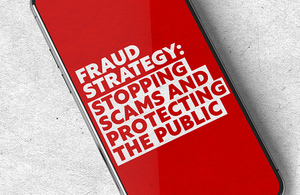Yesterday’s long awaited fraud strategy contained some welcome commitments despite being launched with no new public funding. The strategy focuses however on consumer fraud which costs UK citizens £6.8 billion every year and makes up 41% of all recorded crime in England and Wales.
This is only one part of the UK’s fraud problem. Public sector fraud cost the UK £21 billion in 2021/22 (equivalent to £313 for every UK citizen). This is money lost to the public purse that could be invested in public services and local communities.
Yesterday’s announcement promised that the Public Sector Fraud Authority would produce a separate four-year strategy to tackle public sector fraud. This needs to be brought forward promptly and must contain the ambition needed to tackle the scale of the problem. The UK should be taking note of recent initiatives in the US to invest over $1.6 billion (£1.27 billion), including $600 million (£479 million) for law enforcement, in tackling pandemic related fraud alone.
Tackling consumer fraud and scams
The new fraud strategy sets out some chilling statistics on just how endemic fraud has become, and just how much it costs individuals and businesses:
- £6.8 billion – the economic and social cost of fraud to individuals
- £3,000 – the average personal loss relating to ‘authorised frauds’ where victims are tricked into approving payments
- 18% of businesses – who have been victims of fraud in the last three years.
The new fraud strategy contains welcome initiatives to tackle this such as:
- the appointment of a new Anti-Fraud champion;
- a new National Fraud Squad with 400 new specialist fraud investigators spread across the National Crime Agency and policing;
- a commitment to undertake a review of fraud enforcement including potential structural reform; and
- a commitment to explore with the judiciary whether it can be better equipped to tackle fraud.
These measures may be the beginnings of an antidote to the fraud epidemic, but as commentators have noted, it’s not clear how they can be delivered without a serious uplift in resourcing across the system.
No new money
As with the Economic Crime Plan released in March, the fraud strategy comes with no new public resource. The government said it is investing £100 million to improve the law enforcement, investigative and criminal justice landscape to tackle fraud. This £100 million is part of the £200 million announced in the 2022 spending review that the government is investing over three years alongside the £100 million a year private sector Economic Crime Levy, which is allocated for tackling money-laundering. Of the 400 new specialist fraud investigators announced yesterday, 300 of them are classed as “new or existing”, with no differentiation between how many are new and how many are existing.
The Royal United Services Institute’s (RUSI) proposed fraud Levy on the tech sector should be seized with both hands by the government as a way to inject much needed resource into delivering the strategy. With estimates that 77% of scams are conducted through social media and online marketplaces, the Levy is frankly a no-brainer.
Rising cost of public sector fraud
While there can be no doubting the severity of the fraud epidemic and the misery it inflicts on individuals and businesses, fraud against the public sector is as much a cause for major public concern.
Fraud against the public purse robs the government of vital revenue that could be invested in communities and public services. According to the National Audit Office’s March 2023 report on Tackling fraud and corruption against government, at a best guess given the lack of meaningful data, £21 billion was lost to fraud against the public sector annually between 2020 and 2022. This includes £7.3 billion lost to fraud involving COVID-19 support schemes. This means that COVID fraud cost alone the equivalent to £108 per UK citizen annually.
Furthermore, those figures may just be the tip of the iceberg. If fraud and error is included, the costs rose to between £33.2bn to £58.8bn a year in 2020/21, according to estimates from the newly established Public Sector Fraud Authority. This represents losses of between £500 and £875 for every UK citizen.
So far the government is spending just £11.3 million a year on funding the Public Sector Fraud Authority and just £6 million a year funding the National Investigation Service (NATIS), which is the enforcement body tasked with fighting corruption and fraud in government. NATIS, which is based in the Department for Business and Trade (formerly the Department for Business, Enterprise and Industrial Strategy (BEIS)), had recovered £5.8 million as of January 2023 (against a target of £6 million) as a result of investigations into fraud in the Bounce Back Loan Scheme. Its request to the government in 2020 meanwhile to increase capacity to 136 full time officials was declined.
What would ambition look like?
By comparison, the US is going big on funding law enforcement efforts particularly against pandemic related fraud.
The US’s new $1.6 billion (£1.27 billion) Pandemic Anti-Fraud initiative announced in March 2023 would see $600 million (£479 million) invested in investigating and prosecuting pandemic fraud and $600 million (£479 million) invested in preventing identity theft to prevent future abuses. It would also see $400 million (£319 million) spent on victims of identity theft.
The US plans to set up 10 law enforcement ‘strike forces’ (tripling existing capacity) to recover far more resources lost to the public purse. This is because it is seeing such great returns from the work of the existing three strike forces focused on pandemic related fraud. So far the US Department of Justice has seized over $1.2 billion of assets as a result of pandemic related investigations into $6 billion of fraud.
The US is following a spend to save model recognising that greater public investment brings greater returns. It’s time for the UK government to follow suit.

